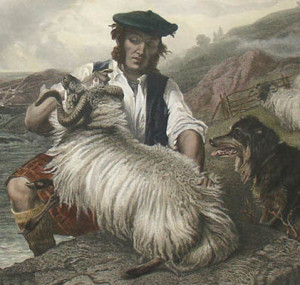
Today’s story comes from Wales. It was published by Walter Y. Evans-Wentz in his book The Fairy-Faith in Celtic Countries.
One day when it was cloudy and misty, a shepherd boy going to the mountains lost his way and walked about for hours. At last he came to a hollow place surrounded by rushes where he saw a number of round rings. He recognized the place as one he had often heard of as dangerous for shepherds, because of the rings. He tried to get away from there, but he could not. Then an old, merry, blue-eyed man appeared. The boy, thinking to find his way home, followed the old man, and the old man said to him, “Do not speak a word till I tell you.”
In a little while they came to a long stone. The old man tapped it three times, and then lifted it up. A narrow path with steps descending was revealed, and from it emerged a bluish-white light.
“Follow me,” said the old man, “no harm will come to you.”
The boy did so, and it was not long before he saw a fine, wooded, fertile country with a beautiful palace, and rivers and mountains. He reached the palace and was enchanted by the singing of birds. Music of all sorts was. in the palace, but he saw no people. At meals dishes came and disappeared of their own accord. He could hear voices all about him, but saw no person except the old man, who said that now be could speak. When he tried to speak he found that he could not move his tongue. Soon an old lady with smiles came to him leading three beautiful maidens, and when the maidens saw the shepherd boy they smiled and spoke, but he could not reply. Then one of the girls kissed him; and all at once he began to converse freely and most wittily. In the full enjoyment of the marvellous country he lived with the maidens in the palace a day and a year, not thinking it more than a day, for there was no reckoning of time in that land.
When the day and the year were up, he wanted to see his old friends again; and thanking the old man for his kindness, he asked if he could return home.
The old man said to him, “Wait a little while,” and so he waited. The maiden who had kissed him was unwilling to have him go; but when he promised her to return, she sent him off loaded with riches.
At home not one of his people or old friends knew him. Everybody believed that he had been killed by another shepherd. And this shepherd had been accused of the murder and had fled.
On the first day of the new moon the boy remembered his promise, and returned to the other country; and there was great rejoicing in the beautiful palace when he arrived. Einion, for that was the boy’s name, and Olwen, for that was the girl’s name, now wanted to marry; but they had to go about it quietly and half secretly, for the fair-folk dislike ceremony and noise.
When the marriage was over, Einion wished to go back with Olwen to the upper world. So two snow-white ponies were given them, and they were allowed to depart.
They reached the upper world safely, and, being possessed of unlimited wealth, lived most handsomely on a great estate which came into their possession. A son was born to them, and he was called Taliessin.
People soon began to ask for Olwen’s pedigree, and as none was given it was taken for granted that she was one of the fair-folk.
“Yes, indeed,” said Einion, “there is no doubt that she is one of the fair-folk, there is no doubt that she is one of the very fair-folk, for she has two sisters as pretty as she is, and if you saw them all together you would admit that the name is a suitable one.”
I like the story. It’s just happy all around, except for the other poor shepherd who got accused of killing Einion.
Thursday’s Tales is a weekly event here at Carol’s Notebook. Fairy tales, folktales, tall tales, even re-tellings, I love them all. Feel free to join in.

Aye poor other shepard